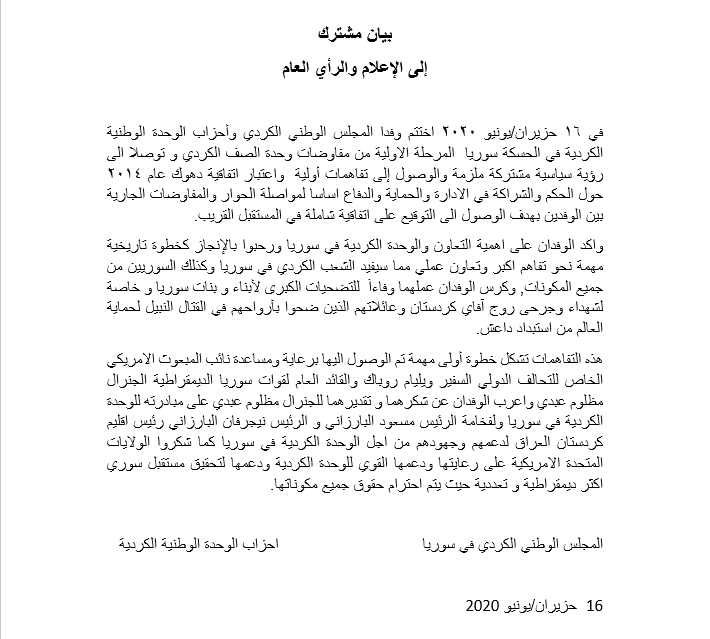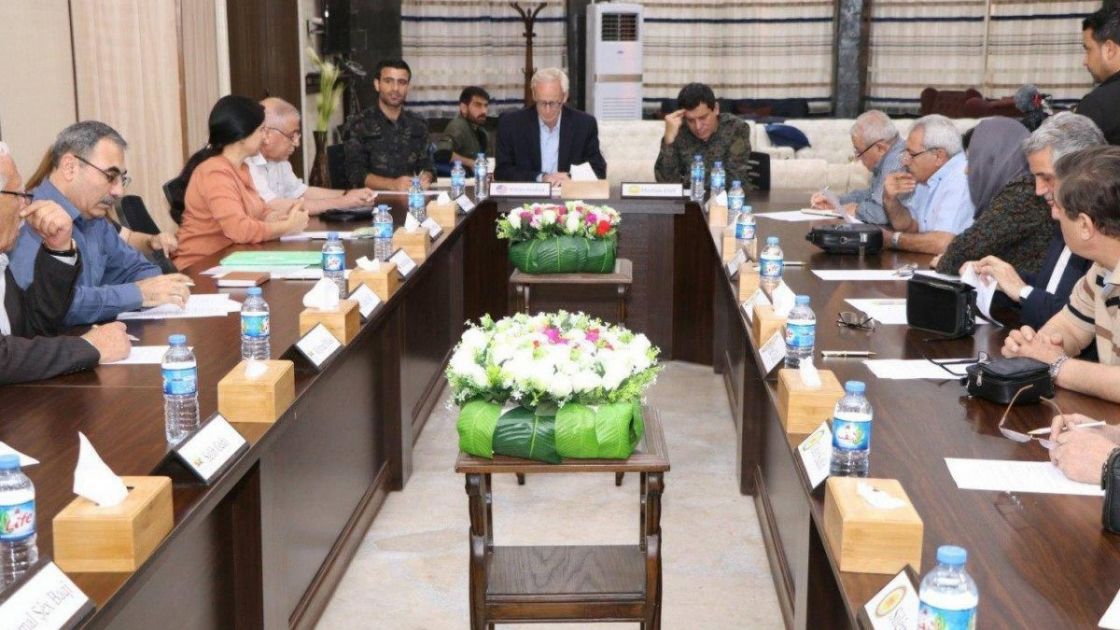- Articles
- Posted
A Preliminary Opinion on the (Preliminary) Kurdish-Kurdish Agreement
The two Syrian Kurdish sides – the Kurdish National Unity Parties, which includes 25 parties, and the Kurdish National Council – announced on the 16th of this month, that they had reached a preliminary agreement after many years dominated by a sort of disconnect between the two parties. There was even a dispute that reached the level of contradiction and an exchange of accusations on many occasions, despite the fact that there is between the two parties, or between major parts thereof, a history of a series of agreements – Hawler 1, Hawler 2, Dohuk – that did not succeed in reaching the desired objectives thereof.
◘Mohannad Dlykan
Reaching an agreement, albeit preliminary, is in itself a positive matter, as the destiny of the Syrian political forces in general is to find a common language and ground after the vast number of conflicts within which multiple international, regional, and local powers have acted. Moreover, the importance of the referenced agreement lies in the reality that everyone knows, which indicates the extent of contradiction between the two parties over the past years.
The intentions expressed by key personalities on both sides centered around a basic idea, which is that this agreement is a prelude to agreements that include the various Syrian political forces regardless of their national affiliation and contribute to working within the Syrian national unity framework. This is also something positive that contributes to the general framework for a political solution to get out of the crisis pursuant to the principle of compromise.
Nevertheless…
We cannot isolate the agreement from the time, place, and circumstances in which it took place, nor from its primary sponsor. We have no doubt that the US and the well-known pressure it exerted to announce this preliminary agreement had not done so in the public interest of Syria. Rather, the US specifically did not do it in the interest of the Kurds. On the contrary, the push by the US for this agreement is for the purpose of employing it against the Syrian interest, against the Kurdish interest, and against the political solution as a whole.
Syrians do not forget, including those involved in the agreement, that the US through its policies toward Syria, which are focused these days on several major axes – the Caesar Act and the criminal sanctions that deepen the tragedy of all Syrians, an attempt to legitimize a-Nusra and complicate the process of dismantling and ending it, direct or indirect cooperation with the big corruptors from both Syrian sides to reinforce the possibilities of a new and wide-ranging eruptions that wipe out the possibilities of the full implementation of UNSC Resolution 2254, that is, reaching a political solution – is working to counter the movement of history, perchance it will keep Syria a quagmire of chaos in order to occupy and drain its international opponents, stand in the face of the inevitable change that is taking place in the international powers balance, and continue exporting its deep internal crises, especially its all-encompassing economic crisis.
Among the negative signals that the US is trying to provide about the northeast as a whole, and about the agreement itself, including the false claim that it will not implement the Caesar Act in the northeast – a claim that can be easily refuted by the Syrian pound situation – is also a key signal in its insistence on isolating this region from the rest of Syrian regions, and subsequently isolating it from the political solution process as a whole. This allows the US and various media outlets to visualize the agreement as an agreement between the Kurds and against the rest of the Syrians, which is exactly what the US is trying to do.
What helps the US in this matter are proposals submitted by some who are part of the agreement, with ambiguous talk about federalism, autonomy, and the like, as well as fanatic nationalist forces on the other side that do not see the Kurdish forces except as evil and separatist forces and so forth.
Using the Spell again the Sorcerer
If the US objectives are understandable to the Syrian patriotic forces – and we are certain that they are understandable for a good portion of the signatories to the agreement – turning the US’ spell against it is still a realistic possibility that must be pursued. The key to this is transforming this preliminary agreement into an entryway to dialogue with the rest of the Syrian forces, in a way that falls within the framework of the Syrian national unity, and on the basis of consensus among them all without prior imposition by any one party on another. In concrete and practical terms, continue pressuring to actively involve these forces within the frameworks of the Syrian political process.
At their core, issues related to the relationship between centralization and decentralization need understandings and compromises among all Syrians, so that neither of the two extreme formulas is preemptively imposed on others.
The formula that the new Syria needs (in our opinion) is a developed formula for the relationship between strong centralization for major affairs (defense, security, foreign affairs, economics, public finance) and decentralization that aims to give power to the people in the regions, so that people exercise a direct role in monitoring and managing various state apparatuses and institutions, as well as participate in managing development in the regions. This would be in parallel with clear constitutional and legal recognition of the national diversity of Syria and the rights of the different nationalities, thus making all Syrians equal citizens before the law.
The Will is Stronger than the Concerns
Although there are concerns and fears raised by many about the preliminary agreement that was announced, it is the duty of the Syrian patriotic forces – whether those who signed the agreement or from the rest of the Syrian forces – to have the national will to put forth double efforts to take this agreement out of the hands of the US and it plans that are hostile to all Syrians. In this context, all these forces must display the spirit of the Syrian comradery and the keenness to get all of Syria to safety.




 Mohannad Dlykan
Mohannad Dlykan